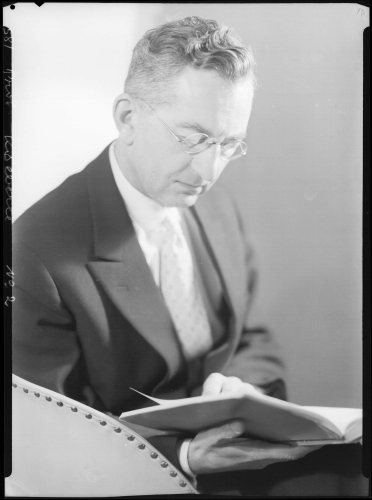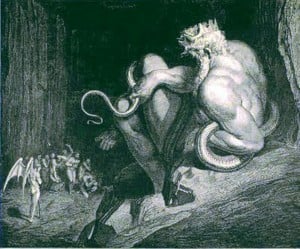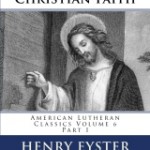
To get at an answer to this question (often put to me more in the form of a charge or accusation), I’d like to direct the reader to an extended excerpt from Adolf Köberle’s very useful work, The Quest for Holiness. If you have never read, or if it’s been awhile since you’ve read, Köberle’s book, then read this chapter sometime today, as it stands alone as a rather marvelous essay. It’s something of a pause in the context of the larger work, in which the author takes time to clarify and reframe “what is at stake.” This I think Köberle does admirably well.
I do not always agree with Köberle, mainly because he has no place in his theological understanding for the Formula of Concord; thus he does not treat of sanctification in both the broad and narrow senses of the term (cf. Sanctification in Conrad Lindberg’s “Christian Dogmatics”). He also doesn’t acknowledge the Lutheran distinction between mortal and venial sin, which, while different than Rome’s view, is still real. That having been said, Köberle is not so easily appropriated by those who wish to stress the monergistic dimension of sanctification to the neglect or even exclusion of its synergistic aspect (cf. Surburg’s blog » Mark’s thoughts: Lutheran synergism and the regenerate will; Gottesdienst Online » On Synergism [the good kind]). Indeed, I have to wonder if many recent proponents of Köberle’s work have even read it.
With that said, I will simply step aside and let the following chapter from The Quest for Holiness, entitled “The Significance of Sanctification in the Preservation or Loss of the State of Faith”, speak for itself. I have bolded several portions of the text which are especially germane to answering the question, “Why do you talk so much about sanctification?” I have also split up some his paragraphs for the sake of ease of reading—my eyes tend to glaze when reading unbroken chunks of text on a computer screen.
One final editorial note, because it’s been a bee in my bonnet for awhile, now…
If something is true, we ought to gladly confess it. Full stop. The emphasis on sanctification taken up by many contemporary Lutherans, clerical and lay, should not be cavalierly dismissed and stigmatized as “wanting to have as much skin in the game as possible”, “wanting to push aside the Holy Spirit and make room for yourself”, “trying to be fruit checkers“, “looking inside ourselves for Christ/assurance”, et al. Perhaps what motivates such Lutherans is rather an earnest desire to discern what is true and gladly confess it. As Christians we have an obligation to believe, teach, and confess the faith in its fullness, not lay a pragmatistic axe to the limbs and branches of our doctrine, taking only that which we find “comforting.” In the final estimation, the truth, the whole truth, and nothing but the truth is comforting, even if in the short term we do not find it to be as comforting as we’d like. Truth norms comfort, not the other way around. “I quite agree that the Christian religion is, in the long run, a thing of unspeakable comfort,” writes C. S. Lewis in Mere Christianity. “But it does not begin in comfort…
…it begins in the dismay I have been describing, and it is no use at all trying to go on to that comfort without first going through that dismay. In religion, as in war and everything else, comfort is the one thing you cannot get by looking for it. If you look for truth, you may find comfort in the end: if you look for comfort you will not get either comfort or truth—only soft soap and wishful thinking to begin with and, in the end, despair. Most of us have got over the prewar wishful thinking about international politics. It is time we did the same about religion.” (C. S. Lewis, Mere Christianity; MacMillan: 1952; 39)
 (Now, if the Lewis-haters feel the need to pop out of the woodwork and inform me that Clive wasn’t a Lutheran, “didn’t get the Gospel”, was a free-will junkie, liked reason too much, etc., I would ask that you kindly save such tiresome prating for your diary, leaving it out of the comments to this post. Or you could subtweet about it. Twitter really is a sort of publicly accessible diary, methinks. Secondly—I know that “Truth is a man, bro.” If you think that this means that we can’t also speak of truth in dogmatic and practical terms, then there’s no point in you and I trying to have a conversation. Enjoy dropping the mic and walking away—yes, we are all mind-blown.)
(Now, if the Lewis-haters feel the need to pop out of the woodwork and inform me that Clive wasn’t a Lutheran, “didn’t get the Gospel”, was a free-will junkie, liked reason too much, etc., I would ask that you kindly save such tiresome prating for your diary, leaving it out of the comments to this post. Or you could subtweet about it. Twitter really is a sort of publicly accessible diary, methinks. Secondly—I know that “Truth is a man, bro.” If you think that this means that we can’t also speak of truth in dogmatic and practical terms, then there’s no point in you and I trying to have a conversation. Enjoy dropping the mic and walking away—yes, we are all mind-blown.)
Moving on…
Lastly, a word of caution: Köberle is really going to twist the dagger in the following selection, and I don’t think anyone can not squirm while reading it, nor can anyone beat his chest and say, “I thank thee, Lord, that I am not like…” This net catches all the fish. So proceed with caution. This is deep stuff. But, to my earlier point, there is certainly comfort to be found when all is said and done.
Are you weak and heavy laden? Flee to Christ in the means of grace. #Advent #Confession HT @esgetology pic.twitter.com/bEeo2A36sH
— Trent Demarest (@p5eudepigrapha) December 6, 2014
From…
Chapter VI.
The Significance of Sanctification in the Preservation or Loss
of the State of Faith
In the course of our previous investigations we have seen that no attempts to gain sanctification by ourselves, whether of moral, mystical or speculative sort, are able to establish a communion with God, because all our human powers have been crippled through the enslaving and condemning power of sin (Chapters I and II). What no efforts at deification were able to attain God freely gave the world in Jesus Christ (Chapter III). In Him He promises and assures us of the two facts: “Thy sins are forgiven thee,” and “Arise and walk!” This renewal applies to the whole man and reaches to all spheres of life; to body, soul and spirit; to understanding, emotion, will and deed (Chapter IV). So no creative part, nor cooperation, which might carry some merit with it, can be attributed to the one who yields to the offer of salvation as it is proclaimed in reconciliation and redemption.
On the other hand man possesses the fearful ability to cast away the salvation that has been offered, and perhaps even attested to him personally, and so to destroy himself. Faith because of thankfulness and obedience, because of fear and love drives man to ceaseless exercise in prayer, self-discipline and service, but the natural man does not cease to despise, to hinder and destroy the “drawing to the Father by the Son” (Chapter V). This conflict in which faith and unbelief strive for the mastery continues till the hour of death. But this conflict has not been sufficiently described if it is simply considered as a general conflict that is bound to come between flesh and spirit because of their divergent principles. It has an animated history that is as full of incident, as difficult and as trying as any warfare between two nations. Here there are great battles and small skirmishes, the gain or loss of territories, displays of courageousness and of weakness, and finally the certainty that its termination must be one of two things, either a final decisive victory or a final and utter defeat. As a general must be vitally concerned in gaining information concerning the position, resources and tactics of the enemy, and as the utilization of all that might bring failure or success in a battle calls for his most strenuous exertions, so it is of vital importance for the miles christianus to know the concealed moral laws governing sin and grace that can either imperil his state of faith, or strengthen and preserve him in the conflict he must face. It is this concrete “history of the warfare of the heart” that we would discuss in the following pages.
Whosoever wants to describe the doctrine of justification must first possess a doctrine of sin. This we tried to furnish in the second chapter. Whoever wishes to provide a doctrine of sanctification must also furnish a doctrine of sins. But is not one sin like another sin, of equal seriousness and with similar consequences, or should we and must we classify them? The Reformation theology in opposition to the Roman Catholic distinction of mortal and venial sins, and the frivolous use often made of that distinction in the practice of the Confessional, always emphasized the fact that sin is an “absolute category” in which there can be no differentiation. Before God every sin, the most trifling as well as the most serious, is a complete rupture of the proper relation of trust and obedience that we owe to God, which in every case makes the offender unconditionally guilty. The theology of the 51st Psalm excludes all “puppet sins.” Before the Holy One the insidious entrance of a presumptuous thought is as grievous as the act of adultery. The degree of guilt is always infinite and requires infinite mercy for its erasure and remission.
 But so far we have only seen one side. Every sin involves something more than its accusing or condemning status before the holiness of God. It likewise exerts a fettering and mastering power over man and it is this aspect we have to consider as we inquire whether every sin has an equal power in enslaving our moral intentions, in dulling and confusing our ability to understand and perceive. It is evident that the answer to this question is to the greatest importance for the preservation or the loss of our state of faith.
But so far we have only seen one side. Every sin involves something more than its accusing or condemning status before the holiness of God. It likewise exerts a fettering and mastering power over man and it is this aspect we have to consider as we inquire whether every sin has an equal power in enslaving our moral intentions, in dulling and confusing our ability to understand and perceive. It is evident that the answer to this question is to the greatest importance for the preservation or the loss of our state of faith.
A survey of the history of theology shows that this very essential problem has received very little consideration. We find the most attention given it in the casuistic literature of Roman Catholic moral theology and in the confessional manuals, the third volume of Albrecht Ritschl’s great work on Justification and Reconciliation, the writings of Johannes Müller and the latest literature of Anthroposophism and the Christengemeinschaft. True, all of these tendencies have shoved the doctrine of sin to a place behind their teaching concerning sins. They think of it more lightly and less seriously than the Second Article of the Augsburg Confession and consequently have always severely criticized this article of the Confession. Here we once more receive the painful impression that theological perception is apparently unable to apprehend or express more than one statement in its entirety. The other side, which in this case is the more important one, is not stated clearly and emphatically, just as the church dogmatics has neglected this phase of the question.

However there have always been some evangelical theologians who saw the fact very clearly and who maintained that every sin established the same infinite gulf between God and man but who did not, on that account, fail to furnish a detailed history and psychology of sin, a satanology and a demonology. The old Lutheran dogmatics, besides their fundamental definitions of sin, provided a classification of “actual sins.” During the past century Culmann, Martensen, Julius Müller, Harless and Vilmar particularly felt this problem and applied themselves to its solution. The last named deserves especial commendation because with all his painstaking discussion of particular sins he always distinguished them from original sin and subordinated them to it, while the first two named, as a result of their theosophical affinity to Jacob Böhme and Franz von Baader, often neglected this essential difference in relative importance. Recently men like Schlatter, Althaus, Elert, Piper and Heim have again called attention to the twofold character of this question.
Nevertheless evangelical theology still lacks a hamartiology which adequately describes the fearful possibilities of sin both in its accusing and its enslaving character, and which is not afraid to learn from the unquestionably able Roman Catholic moral theologians, from Ritschl, R. Rothe and Steiner, without losing Luther’s fundamental view of the enslaving burden of guilt that pervades all sin. For our own presentation, as well as for pastoral care and for training in the service of our neighbor, it is necessary to realize both; how sin invariably destroys communion with God and how it works to accomplish this end. To the dogmatician this second question may appear entirely secondary, but as soon as we begin to reflect more deeply on the moral problem of sanctification we can no longer pass it by as unimportant psychologizing. We have to pause and consider because of what is involved. The one who dodges this question will not get very far.
In his vigorous polemic, Die Theologie der Tatschen wider die Theologie der Rhetorik, Vilmar called for a “teaching concerning temptation.” It is indeed a prerequisite for successful warfare against any foe that we know the way in which he gives battle. The diabolical, uncanny way in which sin operates shows itself through a double manifestation. The one is its apparent insignificance and apparent harmlessness on first sight. It is never suggested that the spark may become a fire, the snowball an avalanche, idle thoughts turn into terrible passions and a voluntary yielding (once does not mean anything!) result in a terrible bondage. Only with the passing of time do the fetters become evident which had been fastened by the commission of the first. The first slip seems voluntary and easily retraced.
But the enemy has a still more dangerous weapon at hand. When enlisting men in his service he not only disregards all reference to future obligations but with the very first handclasp bestows intoxicating pleasure, apparently boundless liberty, and promises still more for the future. The Bible tirelessly paints pictures of the enemy and his manifold deceits, with great clearness and unmistakable warnings; on occasion compares the cozenage of sin to the harlot “who sitteth at the door of her house, on a seat in the high places of the city, to call passengers who go right on their ways.” Whoever follows her “knoweth not that the dead are there” (Prov. 9:14-18). Out of the appreciation of the tricky wiles of the beginnings of sin, from an understanding of the deceptive inversion of all values in the first temptation (eritis secut Deus), faith will acquire a holy fear and vigilance and will understand how the deceiver is the most tricky, and therefore the most dangerous, at the time of his first approach. Once men are pledged to him he soon drops the mask. The one to whom the Spirit has given a “renewed mind” sees the end of the road from the very beginning; sees the ripe poisonous fruit in its seed—and smiles at the efforts of the tempter.
A second bit of understanding that is quite essential for the conflict of sanctification is an insight into the difference in the enslaving power of different sins. The old Protestant division of sins, which is quite in accord with Scripture, into those working internally and those acting externally; into sins of the heart, the tongue and the deed (peccata intern et externa; peccata cordis, oris et operis) is anything but irrelevant trifling. It is true that Jesus in the words of the sermon on the mount used the very expression that dogmatics employed to designate distinctions in act, in the opposite way, expressly to remove every distinction. The angry thought in God’s sight is on an equality with the act of murder, the lustful glance is as evil as the adultery. But because we know ourselves equally guilty in God’s sight in the commission of every sin it does not follow that the effect of evil thoughts, words and deeds is equally significant for myself and my neighbor in every case, and that therefore there is no difference occasioned by the instrument used in its commission, whether it be the heart, the tongue or the hand.
In the first place we cannot take the influence exerted by either a morbid or a wholesome mental life seriously enough. The worst delusion of the materialistic thinking of the past decade is its almost complete loss of reverence or fear of the mighty, invisible power of “mere” ideas. Even a morbid imagination that remains limited to fancies and desires is a terrifying, living power, that can torment and enslave its victims to a fearful degree, creates an atmosphere around itself and infects and poisons others, as it tremendously increases the power of evil in the world, while in a blessed way, all pure, wholesome thinking and feeling, even when it happens in the most obscure places, spreads irresistibly and bears its certain fruit. The unbridled fecundity of morbid and evil imaginations must therefore be mercilessly combated and avoided because, under any circumstances, it is sufficient by itself alone to corrupt man utterly.
But the most uncanny thing about such a play of desires is something else. It is the fact that the unrestrained roving thoughts never remain confined to the hidden chambers of the soul, but they crowd out into the open and display themselves in words and actions, that enslave, burden and shape the future of their author still more certainly than the morbid thoughts. We might say that as in the transition from the friendly disposition to the helpful deed there is always a demon present who would prevent its realization, so in the progress from the wrathful unclean desire to the hurtful work and destructive act, there is a guardian angel on the watch, seeking to hinder us from crossing the threshold. The very hesitation that restrains an evil thought from becoming an external act is proof that here again there is a fresh realization that it would involve a renewed, conscious, deeper descent into evil than that of the previous slavery, and one that would consequently still further weaken the soul.
An evil word is like a sped arrow that cannot be recalled. Its results are immeasurable and beyond all human control. The word has stronger formative power, it multiplies itself more rapidly and quickly than the originating thought. It produces lasting history, enmity and contention; inconspicuously and without effort it mould the opinions and views of many, thus involving all the more responsibility, and so there is special justification for another distinction of the old dogmatics; the one it made between peccata propria, sins that involve only the individual, and peccata alien, sins that involve others, either by awakening in them the slumbering passions or by inciting and strengthening those already active. Because a malicious statement not only weakens the one who utters it in his own powers of moral resistance but involves at least two others, the one spoken to and the one spoken about, it becomes of great importance as to whether the evil intention realizes its purposes or whether it is repressed by the fear of God and the might of the Spirit.
“The word is worse than the thought, the deed worse than the word” (Vilmar, op. cit., p. 224). For it is the deed that finally involves the whole man, binds him closer and closer with the fetters of sin and “makes return harder, the growth of sin easier.” Deeds leave a deeper impression on the character than thoughts. Deeds produce terrible situations that cannot be recalled nor changed and whose bonds the entangled wretch tries in vain to sever by still more serious wrongdoing. It was not the covetous thought, the lustful glance nor the storm in his soul but the actual deed that drove David into such humiliating shamelessness that he caused the rightful husband of the stolen wife to become drunken, so that he could not enter his own house and that finally led to his murder.
 Scripture is especially severe in dealing with sins of the flesh, not only because of the terrible consequences for the companion in sin but above all because they invariably destroy the spiritual gifts of the believer. Adultery and whoredom are therefore always associated with the sins that exclude men from salvation. The other items of the catalogue of vices include a striking number of sins of action. Perjury injures life much more seriously, and ruins it more terribly within and without than the mere dalliance with the thought of its possibility, even though such an evil thought is just as bad in God’s sight as the false oath itself. The power of murder to darken and becloud the soul is far greater than the hateful thought. An accomplished swindle enslaves and torments a man’s life in an entirely different way from the “mere” desire for gold. Erotic stimulation is destroyed and vanishes again where the spirit of discipline prevails, but man loses forever his moral integrity and honor by one act of transgression. The recourse to magic, the “charming” or children produces a deeper depravity and a greater immersion in satanic power than the tempting suggestions of ungodly superstitious thoughts.
Scripture is especially severe in dealing with sins of the flesh, not only because of the terrible consequences for the companion in sin but above all because they invariably destroy the spiritual gifts of the believer. Adultery and whoredom are therefore always associated with the sins that exclude men from salvation. The other items of the catalogue of vices include a striking number of sins of action. Perjury injures life much more seriously, and ruins it more terribly within and without than the mere dalliance with the thought of its possibility, even though such an evil thought is just as bad in God’s sight as the false oath itself. The power of murder to darken and becloud the soul is far greater than the hateful thought. An accomplished swindle enslaves and torments a man’s life in an entirely different way from the “mere” desire for gold. Erotic stimulation is destroyed and vanishes again where the spirit of discipline prevails, but man loses forever his moral integrity and honor by one act of transgression. The recourse to magic, the “charming” or children produces a deeper depravity and a greater immersion in satanic power than the tempting suggestions of ungodly superstitious thoughts.
(Buy book here; read on in Ch. 6 below)
+SDG+












